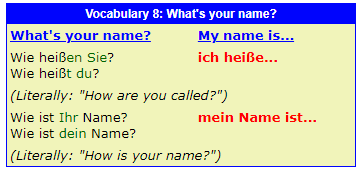1. When you are introducing yourself to other people, you would use your first name in informal circumstances i.e. when you would use "du". Otherwise, you should refer to yourself as "Herr X" or "Frau Y":

2. When you are introducing other people, you can indicate your relationship to them either before their name or after it. In both cases you would start with the words "Und das ist...":

You will notice that the German possessive "my" is spelled "mein" when it refers to a male person, but "meine" when it refers to a female. This will be explained in subsequent chapters.

What's your name?
There are two main ways of asking someone their name and telling them your own. Each of these constructions has two different forms, depending on whether you are in a formal or informal context:

There are thus two versions of the German possessive adjective "your", just as there are two words for the pronoun "you":
"Sie" has the pronoun "Ihr". Note the capital letters!
"du" has the pronoun "dein".
As the word for name (der Name) is masculine, the possessive "dein" has the same ending as "mein" when it referred to a male person earlier in this section. We will discuss pronouns and possessive adjectives in more detail in the next section.
 英语
英语 日语
日语 韩语
韩语 法语
法语 西班牙语
西班牙语 意大利语
意大利语 阿拉伯语
阿拉伯语 葡萄牙语
葡萄牙语 越南语
越南语 俄语
俄语 芬兰语
芬兰语 泰语
泰语 丹麦语
丹麦语 对外汉语
对外汉语

